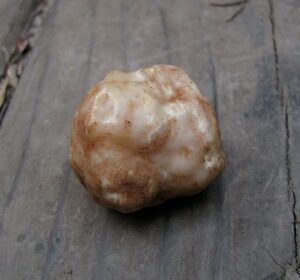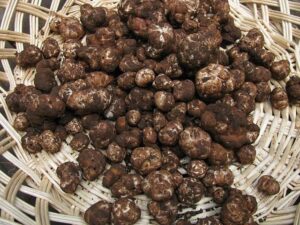Gibbosum


Scientific Name
Tuber gibbosum
Common Names
Oregon white truffle, Spring Oregon white truffle
Seasons
January – June
Description
Closely related to Tuber oregonense both in appearance and in distribution, but Tuber gibbosum have different growing seasons.
Relatively small white truffles characterized by a cinnamon to yellowish brown peridium (“skin”), and a dense, yellowish brown gleba (“flesh”). The peridium is composed of interwoven hyphae.
Aroma/Flavor
The truffle is highly prized for its taste and aroma. Immature truffles have very little aroma.
These truffles need to be handled with care. Improper storage can transform the strong and complex aroma into an unpleasant scent reminiscent of diesel fuel.
Distribution
Found only in the wild of the the Pacific Northwest region of North America (northern California into British Columbia). Some individuals have claimed success in cultivating the truffles in Christmas tree farms.
Dog harvested truffles tend to be of better quality as the dog tend to identify mature truffles. Raking indiscriminately gets all truffles, ripe or not, and results in unreliable crop quality.
See grading guidelines
Other species
- Tuber aestivum (black summer truffle)
- Tubber Borchii (bianchetto)
- Tuber Brumale (Muscato truffle)
- Kalapuya Brunea (Oregon brown truffle)
- Leucangium carthusianum (Oregon black truffle)
- Tuber canaliculatum (Appalachian truffle)
- Tuber gibbosum (Oregon white truffle)
- Tuber lyonii (pecan truffle)
- Tuber macrosporum (smooth black truffle)
- Tuber magnatum (white truffle)
- Tuber melanosporum (Perigord truffle)
- Tuber oregonese (Oregon white truffle)
- Tuber uncinatum (Burgundy truffle)

